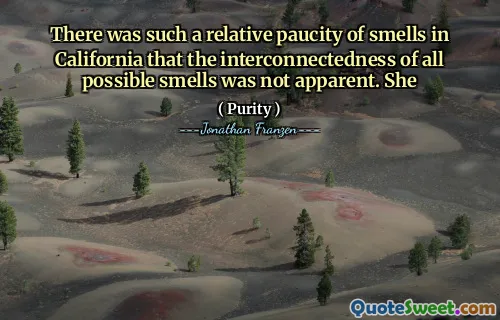"Purity," a novel by Jonathan Franzen, explores the complexities of modern life, relationships, and the search for identity. The story revolves around a young woman named Pip Tyler, who grapples with her troubled family background and elusive sense of self. She embarks on a journey that takes her from her home in the U.S. to Germany and South America, as she seeks to uncover the truth about her past and her mother, who has kept significant secrets about their family history.
Franzen delves into themes of privacy, truth, and the intersections of personal and political lives. As Pip gets involved with a mysterious organization led by a charismatic figure, she faces moral dilemmas that challenge her beliefs and values. Throughout her experiences, the novel examines the nature of purity itself—whether in relationships, personal ethics, or societal norms—and how these ideals often clash with reality.
Through rich characterization and intricate plotting, "Purity" captures the anxieties of contemporary life. The narrative traverses various locations and perspectives, ultimately leading to revelations about connection, responsibility, and the pursuit of meaning in an increasingly complex world. Franzen's skillful storytelling invites readers to reflect on their own notions of purity and the lengths one might go to achieve it.
More »
Today Birthdays
1729 -
Edmund Burke
1949 -
Haruki Murakami
1954 -
Howard Stern
1876 -
Jack London
1993 -
Zayn Malik
1951 -
Kirstie Alley
1863 -
Swami Vivekananda
1923 -
Alice Miller
1987 -
Naya Rivera
1825 -
Brooke Foss Westcott
1944 -
Joe Frazier
1951 -
Rush Limbaugh
1964 -
Jeff Bezos
1978 -
Jeremy Camp
1628 -
Charles Perrault
1856 -
John Singer Sargent
1970 -
Kaja Foglio
1953 -
Rick Santelli
1986 -
Gemma Arterton
1968 -
Raf Simons
1958 -
Christiane Amanpour
1966 -
Olivier Martinez
1996 -
Ella Henderson
1917 -
Maharishi Mahesh Yogi
1949 -
Ottmar Hitzfeld
1928 -
Ruth Brown
1968 -
Heather Mills
1946 -
George Duke
1968 -
Rachael Harris
1923 -
Ira Hayes


